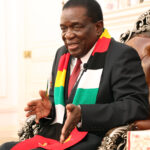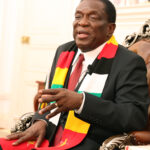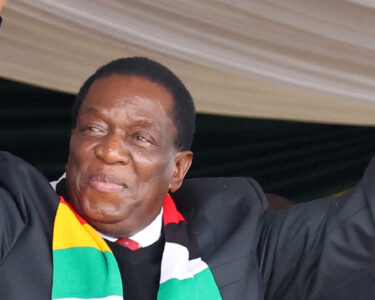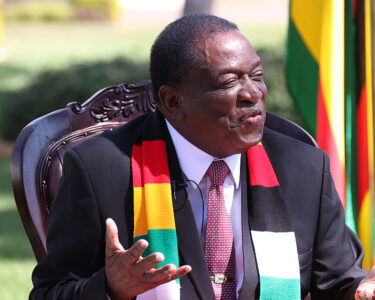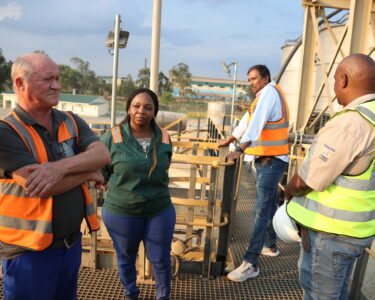- No more tax holidays
- 50 % royalties in processed minerals
- Government wants to see beneficiation plans
Zimbabwe is fast becoming a very attractive investment destination for many international mining companies. This has led to the revival of the country’s mining sector, forcing the government to come up with laws to ensure that mining companies beneficiate mineral exports to push the modernisation and industrialisation agenda.
In terms of royalties, the government has come up with Statutory Instrument 189 of 2022 that compels mining companies in the gold, diamond, lithium and platinum group of minerals to pay 50 percent of their royalties in processed minerals and 50 percent in cash. This is a first in Africa because instead of inheriting holes in the ground following the extraction of several minerals, the country will now have stocks of processed minerals to build its reserves.
As the demand for Zimbabwe’s minerals keep growing, the government has woken up to some realities and it’s not going to be a walk in the park for investors in the mining sector. In this interview with our Editor-in-Chief, Munyaradzi Huni, President Mnangagwa makes it boldly clear that the government has learnt some lessons and there won’t be any tax breaks for investors in the mining sector. Clearly, the honeymoon is over in Zimbabwe’s mining sector. Read on…
Question (Q): Your Excellency, over the past few months, you have been going around the country commissioning several mining projects. There is clearly a sudden revival of the mining sector. What would you attribute this revival to, considering that even some countries that are known to be hostile to Zimbabwe are flocking back to invest in the mining sector?
Answer (A): Well, what is unchangeable is the fact that Zimbabwe is blessed with numerous minerals. Usually, the question is what don’t we have rather than what do we have? We have a long list of minerals in the country. The second question is – why haven’t we been extracting these minerals for the benefit of our people and to develop our country? The answer is – there were no willing investors to come into that sector for various reasons, including the perception that Zimbabwe was not a safe investment destination.
Under the Second Republic, we have dispelled this perception by our engagement and re-engagement policy. Now, many foreign companies feel safe and comfortable to invest in Zimbabwe. This is what is happening, leading to the revival of the mining sector.
As you may know, the earnings in the mining sector from the time the Second Republic came in was around US$2, 8 to US$2, 9 billion per year. Now we are around US$7, 7 billion per year. Next year when most of the new and old mines will be in full operation, we should be able to clock US$12 billion per year.
This growth from about US$3 billion to about US$12 billion demonstrates the fact that we have a really good mining sector in the country and that foreign companies are feeling safe to invest in Zimbabwe. The environment to invest in the mining sector is conducive.
Q: The Second Republic has also been pushing for mining companies to beneficiate mineral exports in the country? How are the mining companies responding to this policy?
A: Depending on what you are talking about because not every mineral has to be beneficiated. Yes, we have put that as a policy and there is no going back. Let me begin with the old set-up. The biggest mining companies for example those three or four companies in the platinum sector – when we told them that we want you to stop carrying our platinum for beneficiation in South Africa, they asked for a period of three years to establish factories that process the minerals in the country.
I believe they are in the process of doing so. I think one of them, I think it’s Zimplats from what I have been briefed, is almost ready to commission a factory to process its minerals. Those in the platinum sector will stop exporting platinum until it is processed locally.
Let us move to the gold sector. We already have Orex Jewellery in the country. As you know, already about ten percent of our gold, we retain it in the country for companies like Orex to process it into various gold products. The door is open for anybody who would want to venture into gold beneficiation in the country. So far, the ten percent which we retain for those in the country who want to beneficiate it is adequate. If we have more people processing gold in the country and if the ten percent is not enough, we will increase the percentage of the gold retained in the country.
This also applies to diamonds. We have a certain amount that we keep in the country for those who would want to process the diamonds. However, the percent we are retaining in the country at the moment is not being fully utilised.
Going forward, we have minerals like lithium. This is a recent discovery. It was there for many years and only Bikita Minerals, I understand, was mining it. For many years, we were all asleep. We didn’t know it was that important. Perhaps at that time it was not that important. Suddenly, lithium has become a very, very attractive and important mineral. We have now put legislation in place to forbid the exportation of lithium from this country. We are calling for the beneficiation of lithium. We took this decision to have the maximum benefit from our minerals. We are determined to achieve this and we are not looking back.
Q: Mr President, let me take you back to the gold sector. I have been looking at the top 100 gold holders in the world. I didn’t find Zimbabwe. Ghana which is reputed to be the largest gold producer in Africa is number 59. This seems to show that countries in Africa are producing gold and exporting it for paper money and all we are left with, all we are inheriting, are holes in the ground. Yesterday the government of Ghana came out saying it doesn’t have money to pay external debts but Ghana is the number one gold producer in Africa. What is Zimbabwe doing to avoid the pitfalls that Ghana finds itself in today?
A: Well, I accept that Ghana, historically is one of the top gold producers in Africa. That is given. But we also have our own gold. I don’t know at what level we can be listed on the African continent. However, we are not worried about being listed. The important thing to us is that we have gold in the country.
All this time, we have been mining our gold and exporting it with nothing remaining to show that we produce gold in this country. But since the 1st of October 2022, there is now a law that all royalties on gold, platinum and other minerals should now be paid to government, 50 percent in cash and 50 percent in processed minerals. In the past the royalties were paid in monetary terms but from the 1st of October 2022, we changed all that.
If a company was paying let’s say five percent or seven percent of their production in monetary terms, they are now paying half their royalties in processed minerals. Yesterday, I was checking with the governor of the Reserve Bank of Zimbabwe, Dr John Mangudya and he told me that “any day Mr President you find the chance, come to the Reserve Bank so that I show you the gold we now have in our reserves.” He said “if you want to see gold, I will show you here it is. If you want to see diamond, I will show you here it is.” He told me that just in two months, we have a good stock of the minerals.
We were discussing about the platinum that these companies are giving us. We discovered that the companies are just giving us platinum yet there are other by-products of platinum that they are not giving us. Our Statutory Instrument (SI) did not address this issue and we are in the process of interrogating how the SI can be amended to include all the by-products. At the end of the year, we should be having reserves in commodity terms rather than in US dollars.
Q: You don’t have any platinum facility in the country. How are you going to operationalise this SI?
A: This is what I referred to at the beginning about refineries being built by companies such as Zimplats. We gave these companies a period of three years and this is the third year. The companies are on course to meet our directive. All the beneficiation of platinum will be done in the country and we are on course to achieve this.
Q: A few days ago, the government gazetted a new lithium law banning the export of lithium ore and unpurified lithium salts. What prompted the enactment of this law and do you think this law will help the country?
A: Look, when the lithium is in the ground, it remains ours and we can sleep because it is ours. But once it has been taken out, it can’t go back into the ground. And so we must get the maximum value of that lithium. For example, instead of getting about US$1 500 from the lithium ore or unpurified salts, if we add value it will increase value to about US$7 000.
We are coming up with these laws to make sure we get the maximum value from our minerals. If we don’t have the technology or the expertise to beneficiate the lithium, we will keep it underground and not disturb it. The time to export raw minerals is over. If anyone wants to disturb our lithium from the ground, he or she should do so at the benefit of Zimbabweans, not other people.
Q: During the function at Sabi Star Mine in Buhera, you announced that mining companies should share with government their beneficiation plans. What prompted this move by the government?
A: It is the desire to get maximum benefit from our minerals. In the past, because we didn’t have that focus and much expertise on mineral extraction, we got the primary value of our minerals. Some of the companies would even apply for privileges and they were being granted tax breaks and so on.
You give a mining company these privileges and it makes say about US$100 million. This company is given two-year or five-year tax breaks as incentives. So for two or five years the company takes US$100 million out of the country every year and you are just looking your money being taken out. Now there are no more incentives like that. We have learnt our lessons. You can go and mine in a country where they give you such incentives. Here in Zimbabwe, NO.
We now know that there is no need for such tax breaks. We now know that during the first or second year, you are already making money. We have to benefit from our minerals and there is no going back on this one.
Q: Are all these measures that the government has come up with in the mining sector, a way of busting the illegal economic sanctions against the country?
A: The people who imposed sanctions against our country had their own agenda. As we exploit our minerals, we have our own agenda. We are not thinking of the illegal sanctions. Sanctions or no sanctions, our minerals should serve our economy. Our minerals should serve our people and they should assist in developing our country. They should help us in our modernisation and industrialisation agenda.
In fact, the illegal sanctions have been with us for about 22 years now. A child who was born about 22 years ago doesn’t even know life outside the sanctions. We now have sanction children and we are a sanction nation. We have reached a stage where we should not be worried that we have sanctions.
Q: Your Excellency, the Ministry of Mines and Mining Development has set up a US$12 billion target by 2023. Is the government on course to achieve this target?
A: Yes. In December, we reached around US$8 billion. We are very much on course. We have so many new and old companies coming up and we are very optimistic. We have many lithium companies coming on stream next year.
There is also the Mapinga Mines to Energy Industrial Park. This is a US$13 billion investment. The beneficiation of our minerals is all cited in that park. By the time that industrial park will be fully operational, this will be an investment worth over US$20 billion. We are on course to meet the US$12 billion target. In fact, we will burst the target.
Q: Are you happy with the contribution of the mining sector to Vision 2030?
A: If the mining sector is growing from contributing US$3 billion to about US$8 billion within four years, why wouldn’t the government be happy? Why wouldn’t I be happy?
Q: In recent months, the government also discovered uranium deposits in the country. Uranium is a very strategic mineral. What does the government intend to do with it?
A: We have not yet made any decision on uranium. The last time uranium was discussed, it was during President Mugabe’s time. At the time, some countries in the West wanted it and some countries in the East wanted it. President Mugabe then said; “you go West, the East says you are cooperating with the West and you go East, the West says you are cooperating with the East. So let us keep our uranium until the environment is correct and conducive to exploit it. No one will steal it.”
Our uranium is still there and we are not in a rush to exploit it. It’s still in the ground and it’s still ours. The big powers know where it is but we are not going to be rushed into anything.
Q: The government also discovered oil and gas deposits. These deposits in other countries have become a curse, leading to financial mismanagement and even wars. What is Zimbabwe going to do differently as it exploits these oil and gas deposits so that they don’t become a curse to the country?
A: I don’t know how the oil and gas deposits have become a curse in other countries. I don’t know how they cause wars. As far as we are concerned we have the deposits in Muzarabani and the companies there are very positive that they have very huge deposits. They are still conducting surveys and they will announce the results in due course.
As government, we will be very happy if the results are positive. Once we start exploiting the deposits, we won’t be importing oil and we won’t be importing gas. Our challenges in the energy sector will also be resolved. The issue about fuel queues will be something we will read in books.
Q: Regarding these oil and gas deposits – who is who in terms of ownership?
A: The oil and gas, we never saw anyone bringing it into the country from somewhere. Only God knows why He put it here and only God knows why He put blacks in this country. So the oil and gas belong to us. If anyone wants to exploit our oil and gas, he or she has to exploit the oil and gas on our terms, and not their terms. We are very, very clear about that. We are sovereign and we don’t answer to anybody. Either you work with us on our terms or you go elsewhere and leave our resources.
Q: Gas deposits have also been discovered in Lupane. What is the government’s strategy to exploit the deposits?
A: We don’t have the technology and the capital to exploit the gas. The deposits are there for those who would want to exploit the gas. Anyone with the capital and expertise can invest there, of course at our terms.
Q: The government has also came up with the concept of mines to energy which will see the establishment of the mines to energy park in Mapinga. Why is the government restricting itself to mines to energy only? Why not also mines to industry and mines to agriculture?
A: That’s a very good idea. Very good idea. Why don’t you write a paper and show us how to do it. We have never thought about it. Can you give me a paper on that? Very good idea.
Q: Your Excellency, Zimbabwe also has huge deposits of coal which according to experts will last for many years…
A: Not many years. They will last forever. (laughs)
Q: Yes, Your Excellency. However, there is a global drive to ban the use of coal by some developed countries. What is Zimbabwe’s position regarding this move, considering that some of the developed countries are going back to revive their old coal mines following the war in Ukraine?
A: Zimbabwe cannot walk out of step with the rest of the world. There was COP 26 in Glasgow and COP 27 in Egypt. The Third World countries felt that the damage to the ozone layer, through coal emissions, as alleged by the First World countries was caused by these same countries as they were industrialising. The First World countries then came up with a position that we need to move away from using coal for power generation. They advocated for the use of green energy.
The Third World countries then said we need a period of transition from thermal power to green energy. During that transition, we said we need assistance from the First World. This is the position we have taken and Zimbabwe is solidly behind that position.
Q: Are the First World countries assisting as they promised?
A: They pledged US$100 billion. I understand part of the money has been deposited and a few Third World countries have so far benefited. As Zimbabwe, we have not yet benefited.
Q: Over the past few years, some Russian companies have invested heavily in the country’s mining sector. Following Russia’s Special Operation in Ukraine, are these Russian investors going ahead investing in Zimbabwe? Are they still in or they are out?
A: No. I don’t think the war, the Special Operation by Russia in Ukraine can affect Russian investments in Zimbabwe. The people who make decisions are not us. It’s the investors. If the investors feel they want to disinvest, they can disinvest. We will not ask them to disinvest.
Q: China has also invested heavily in the country’s mining sector with the Manhize Iron and Steel Plant being one of the flagship projects. How do you see this massive investment changing the face of the iron and steel industry in Zimbabwe and Africa in future?
A: Many international companies are being attracted by the investment opportunities in our country. They are happy with the conducive investment environment and we are also happy to receive their investments. This will help us in our drive to industrialise the country. Steel is part of the enablers for industrialisation. The face of the iron and steel industries in Zimbabwe and Africa will definitely change. We are excited. Just watch the space.
Q: Do you think the massive interest to invest in Zimbabwe by Russia and China could have triggered America’s recent anger against Zimbabwe, leading to the addition of new individuals and companies on the sanctions list?
A: The investment by China and Russia does not offend us. If some people sitting somewhere are offended because some powerful countries are investing in our country, we really don’t care. We don’t get offended by them being offended.
Q: Your Excellency, let me ask you about an issue that will soon be very topical. It’s a bread and butter issue. Zimbabwe will soon be holding the much-awaited elections. Is the country ready to hold the elections?
A: We have been holding elections since the attainment of our independence in 1980. Every five years since independence we have been holding elections. We know we are going to hold elections in 2023 and we are going to hold those elections. There is no two ways about it. We are going to hold very transparent, free and fair elections as we have always done.
Q: Are you going to invite foreign observers?
A: In the past we did and I don’t think there is any reason now we should not invite them. That has always been the practice. I don’t know where the question comes from when you know that we have been inviting them. Last time, in 2018, it was open. Those who wanted to come and observe our elections were free to do so.
Q: Are you going to invite some of the countries that have been hostile to Zimbabwe?
A: I don’t know which countries you are saying are hostile to Zimbabwe.
Q: The European Union for instance?
A: Yes, we will. When we had our elections last time, they were speaking the same language and up to now they haven’t changed. But we will invite them.
Q: How do you see your chances of victory in the forthcoming elections?
A: I am so confident that I will win these elections…I can assure you that I am very confident that I will win.
Q: Why are you so confident?
A: I am this confident because Zanu-PF is solid. If you go to any part of the country and say “Pamberi neZanu-PF” people will chant back saying “Paamberiii neZanu-PF!” But go anywhere and say “CCC” many will ask you “what is that?”



